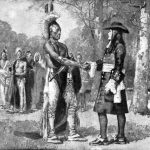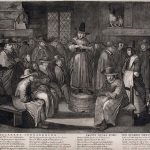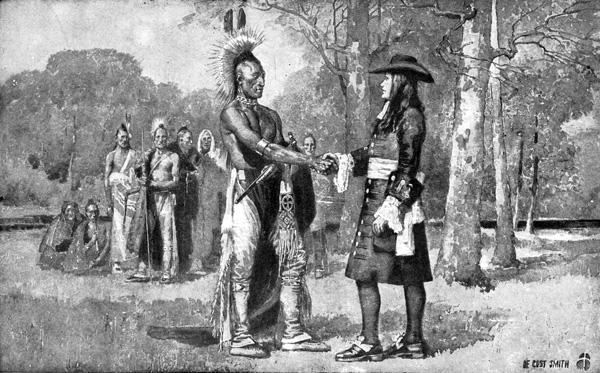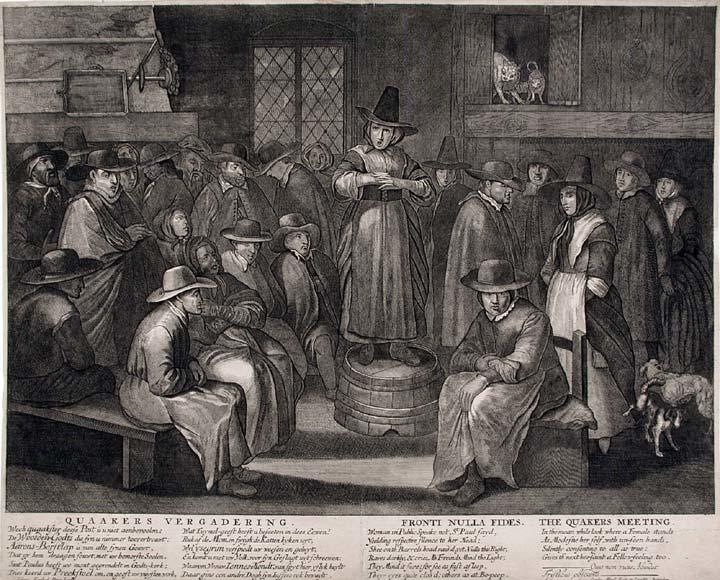Quakers actually entered the colonies much earlier than 1682, the traditional founding date for Pennsylvania. At the movement’s inception, in the early
1650s, Quakers came to New England in an effort to protest the residual religious forms that Puritans allegedly carried with them to Massachusetts Bay,
Connecticut, and Plymouth Colony. Like their English counterparts, colonial Quakers accused the Puritans of supporting a hireling clergy, practicing
idolatry in the form of images and altarpieces, and encouraging spiritual deadness through written creeds and theologically sophisticated sermons.
Officials in New England persecuted Quakers through imprisonment, banishment, and execution, most spectacularly in Massachusetts Bay between 1659
and 1661, when four Quakers were hanged. Many Quakers found refuge in Rhode Island, where Roger Williams had established a haven for persecuted
sectarians and dissenters ever since his own banishment from Massachusetts Bay over twenty years earlier. But the main body of colonial Quakerism
was centered on the Delaware Valley region, as large numbers of persecuted Quakers arrived in the 1680s and 1690s to help realize William Penn’s
vision of a holy experiment in the New World.
In 1681, Pennsylvania Quakers organized the Philadelphia Yearly Meeting. This meeting was composed of representatives from lower-level weekly,
monthly, and quarterly meetings. Thus, the Quaker form of church government most closely resembled the presbyterian system advocated by English
Puritan reformers in the 1640s. The Philadelphia Yearly Meeting took up weighty issues of policy for the expatriate Quaker community, including the
issues of wealth and worldliness, Quaker and non-Quaker intermarriage, war and peace, and slavery. The advices of the yearly meeting stand as a record
of Quaker engagement with the world, a catalogue of the Quaker struggle to resolve several key tensions that emerged within the sect. These efforts
entailed an ongoing battle to bridge the gulf between the inward and outward aspects of life and to create social standards within a sect that otherwise
stressed individual conscience. Friends received these advices in their monthly meetings and sometimes used them as instruments of discipline for errant
followers.
Discipline aside, Pennsylvania Quakers actively promoted the principles of religious freedom and toleration and worked to eliminate forms of oppression
that they believed violated the teachings of Jesus. Penn’s early charters for the colonies, such as the West Jersey Concessions and the Frame of
Government of 1682 (Pennsylvania), provided for freedom of religion. This placed Penn in rare company in seventeenth-century England as a lawmaker
committed to a written constitution enshrining the principle of religious toleration for all sectarians and dissenters. Gradually the idea of religious toleration
gained traction, leading to the Act of Toleration (1689) in England and maturing in the U.S. Constitution’s First Amendment guarantee of religious liberty.
The Quaker-led campaign against religious oppression dovetailed with their campaign against war. Quakers believed that war stemmed from a lust for
power. They also stood against oath taking of any sort, which complicated their relationship to the state in general.
By the 1660s, Quakers had developed a Peace Testimony that forbade followers from participating in war or supporting it in any way. This position
interfered with their efforts to provide for the defense of the colony of Pennsylvania during the War of the Spanish Succession, when French raiding
parties threatened coastal and estuary settlements along the Atlantic seaboard.
Finally, in 1756, the Peace Testimony prompted many Quaker legislators to withdraw from the Pennsylvania Assembly so that the colonial government
could prepare unimpeded for another war with France. As such, the Quaker principle of pacifism rendered the sect a minority party in the legislature for
the first time since the start of the eighteenth century, and there it would remain for the rest of the colonial period.
The meeting is the heart of Quaker practice. The term is used to designate the gathering of adherents for worship, monthly congregational meetings for
fellowship and the transaction of business, and the high-level administrative unit of the Society of Friends. (Museum of Fine Arts, Boston/Bridgeman Art
Library)
Quakers in the Colonies Photo Gallery
Maybe You Like Them Too
- Top 10 Islands You Can Buy
- Top 10 Underrated Asian Cities 2023
- Top 10 Reasons Upsizing Will Be a Huge Travel Trend
- Top 10 Scuba Diving Destinations
- The Best Cities To Visit in The World






